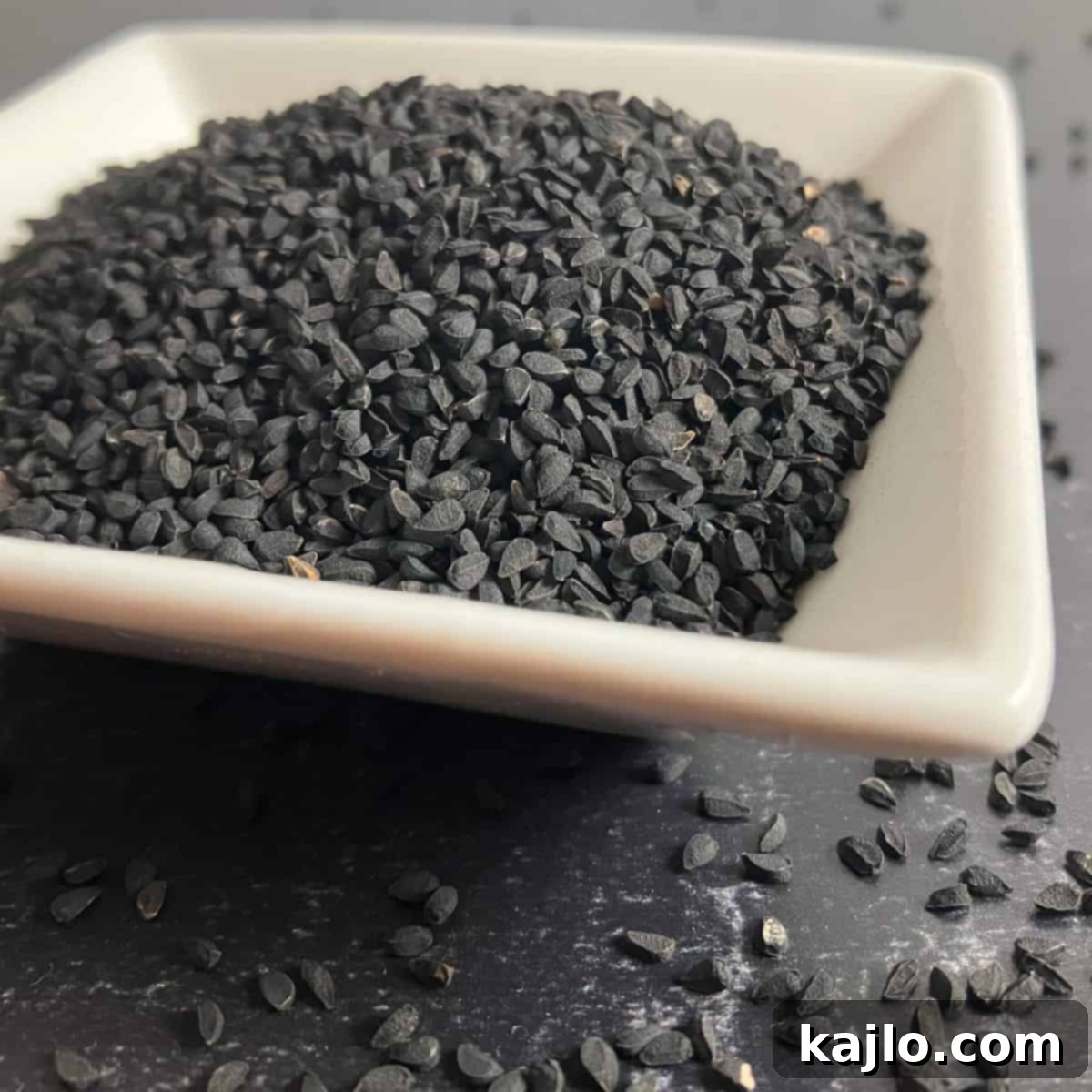Understanding the best nigella seed substitutes (also known as kalonji seeds or black onion seeds) is crucial for any home cook when the unique spice isn’t readily available. Whether you’re dealing with a dietary restriction, an allergy, or simply a depleted pantry, finding a suitable nigella seeds alternative can make all the difference in your culinary creations. This comprehensive guide will explore various options, delve into the flavor profiles, discuss nutritional aspects, and provide practical advice on how to replace nigella seeds effectively in your recipes. The ideal nigella seeds replacement will depend heavily on the specific dish and the characteristics you wish to replicate – be it appearance, texture, or its distinctive herbaceous flavor.
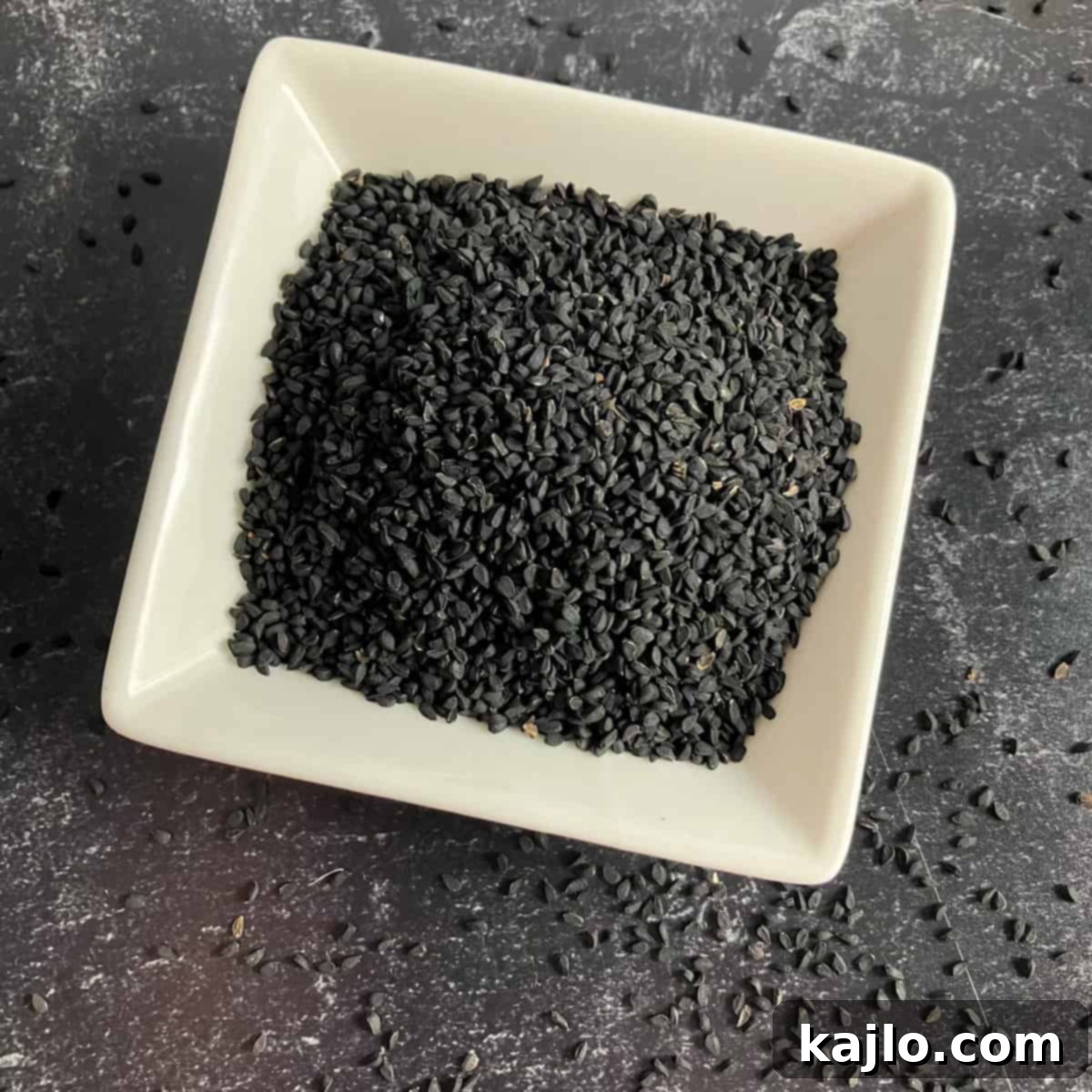
Understanding Nigella Seeds: Other Names and Botanical Identity
The spice we know as nigella seed is a fascinating ingredient with a rich history, but its common aliases can often lead to confusion. Historically and culturally, nigella spice is known by several other names, including:
- Nigella Sativa Black Seed
- Black Onion Seed
- Kalonji Seed
- Calonji
- Black Caraway Seed
- Black Cumin Seed
- Roman Coriander
- Fennel Flower
- Black Fennel Seed
- Charnushka (a Russian term)
These various names are a significant source of misunderstanding, as they often imply a botanical or flavor relationship that simply doesn’t exist. Despite names like “black onion seed,” “black caraway seed,” or “black cumin seed,” nigella seed is not related to onions, caraway, cumin, fennel, or coriander. Each of these refers to different plants with distinct flavor profiles and botanical classifications. Nigella sativa, the plant from which nigella seeds are harvested, actually belongs to the buttercup family (Ranunculaceae), setting it apart from all the aforementioned spices.
Nigella seeds themselves are small, jet-black, and typically have a somewhat pointed or triangular shape. While they share a similar dark hue and small size with black sesame seeds, their slightly more angular form often helps distinguish them upon closer inspection.
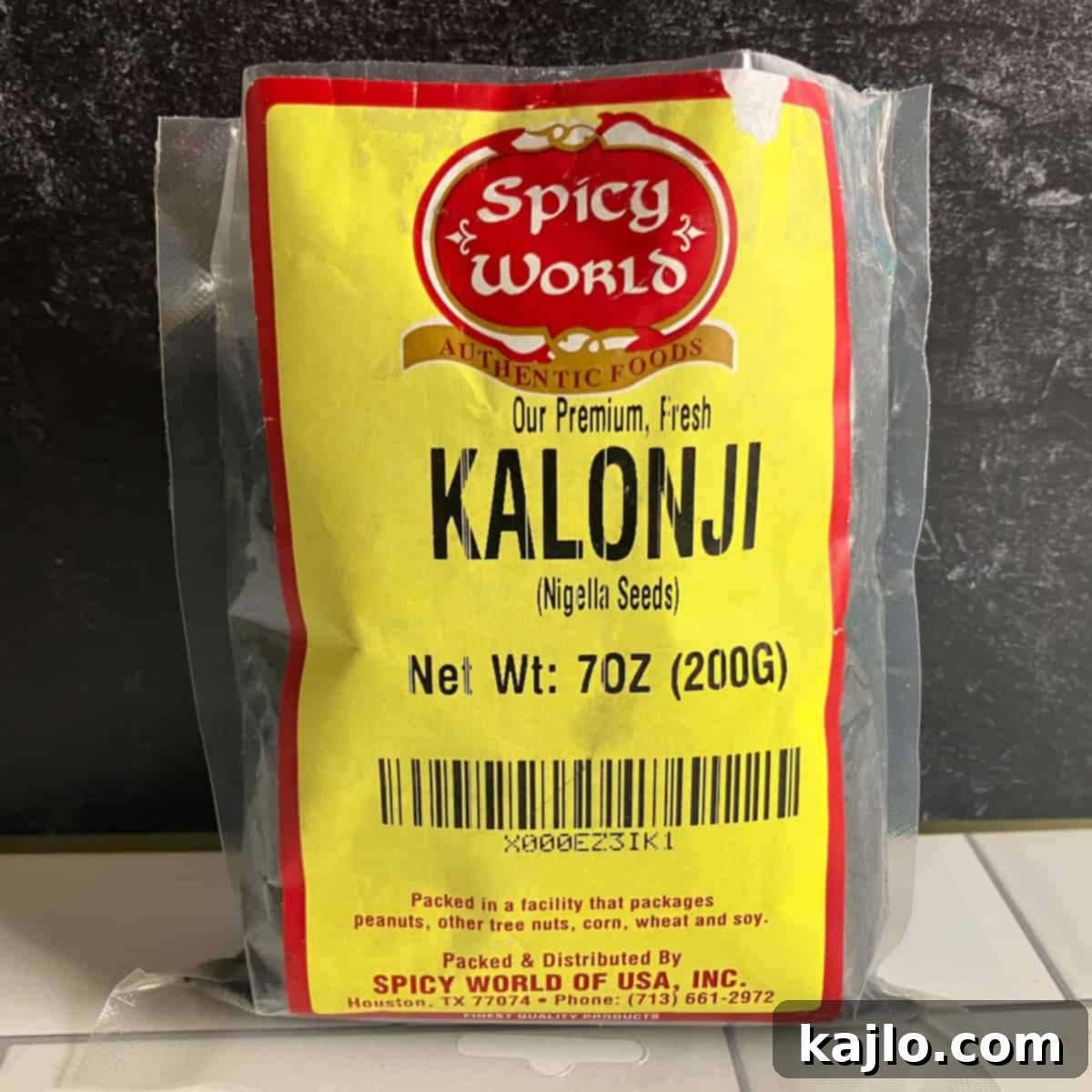
Black Onion Seeds vs. Nigella Seeds: Clarifying the Misconception
One of the most common points of confusion arises from the name “black onion seeds.” It’s important to clarify that “black onion seeds” (or simply “onion seeds” in some contexts) are simply another colloquial name for nigella seeds. This naming convention is purely descriptive of their appearance, not their origin or taste. You cannot cultivate red, white, or yellow onions from black onion seeds. Furthermore, and perhaps surprisingly to many, nigella seeds do not possess an onion-like flavor. Their taste profile is entirely unique, contributing to their distinct culinary role.
🏆 Discovering the Best Nigella Seed Substitutes
When searching for the ideal nigella seeds alternative, it’s essential to consider what aspect of the nigella seed you’re trying to replace: its visual appeal, its texture, or its unique flavor. For a striking visual similarity and a comparable textural crunch, black sesame seeds are generally considered the best nigella seed substitute. However, if the distinct herbaceous flavor and aroma are your primary concern, then fresh or dried oregano often provides the closest match.
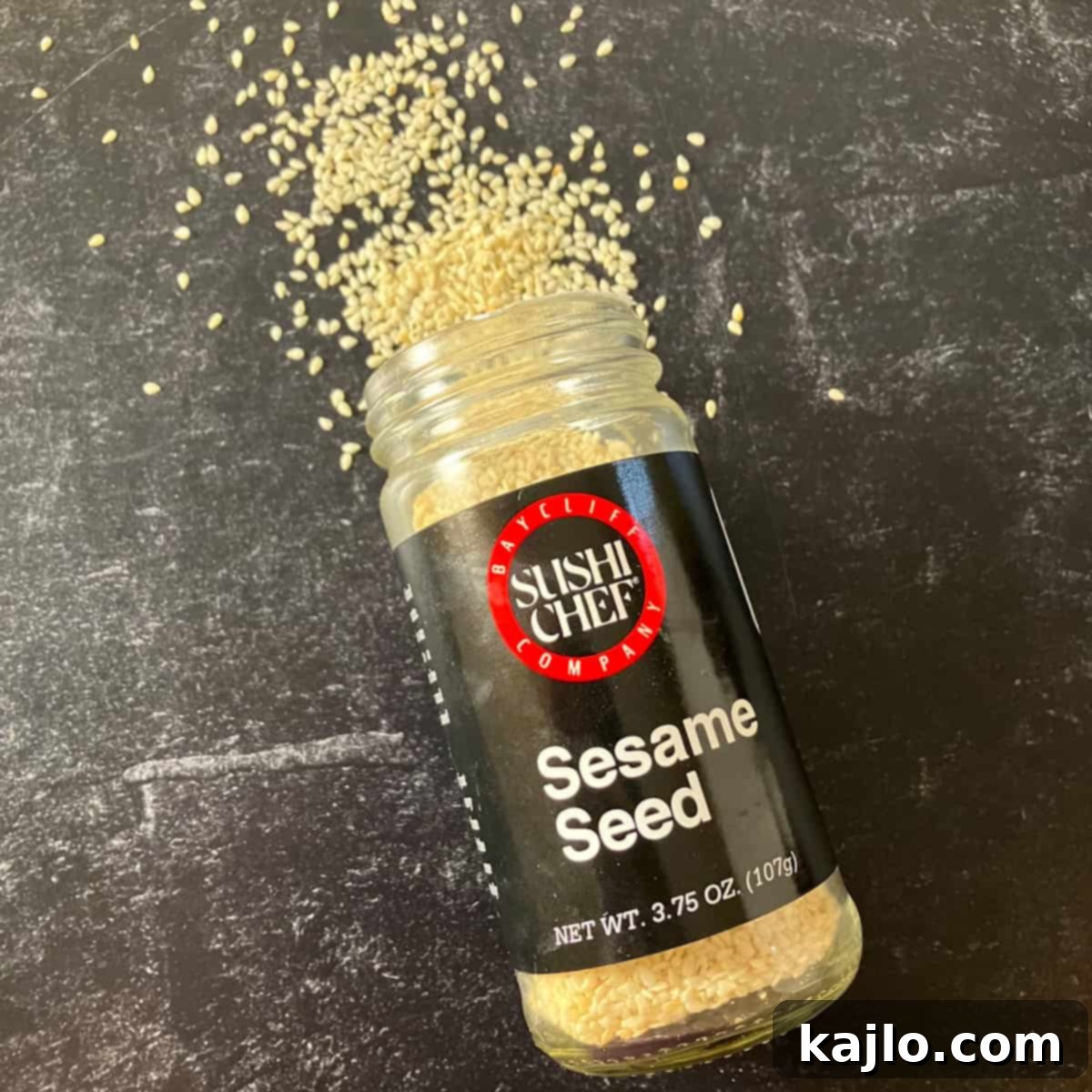
Here is a comprehensive list of potential nigella seed substitutes to consider, each with its own advantages and disadvantages:
- Black Sesame Seeds: These are excellent for mimicking the visual appearance and providing a similar crunchy texture. Their flavor is nutty rather than herbaceous, making them ideal for garnishes where the visual impact is paramount.
- White Sesame Seeds: If black sesame seeds are unavailable, white sesame seeds can still offer a similar texture and a mild nutty flavor, though they won’t match the dark color.
- Oregano (Fresh or Dried): This herb offers a remarkably similar herbaceous and slightly peppery flavor profile to nigella seeds, making it the top choice for replicating the taste. It won’t, however, provide the same visual or textural element.
- Celery Seeds: These small, dark seeds have a strong, slightly bitter, and earthy flavor reminiscent of celery. Use them sparingly, as their intensity can easily overpower a dish.
- Poppy Seeds: Black poppy seeds offer a similar size and dark color to nigella, making them a good visual stand-in. Their flavor is mild, nutty, and slightly fruity, differing from nigella’s herbaceous notes.
- Chia Seeds: These tiny black seeds share the dark color and small size. When dry, they provide a crunch suitable for toppings. However, when exposed to liquid, they form a gel, which changes their textural contribution significantly. Their flavor is very neutral.
- Caraway Seeds: With their distinctive anise-like, earthy, and slightly peppery flavor, caraway seeds can be a flavorful substitute, particularly in savory breads and stews. Their appearance is quite different from nigella seeds.
- Fennel Seeds: Often confused with nigella due to historical misnomers, fennel seeds have a strong licorice-like flavor that is distinctly different. Use only if a sweet anise flavor is desired.
- Cumin Seeds: Cumin offers a warm, earthy, and slightly smoky flavor. While it won’t match nigella’s herbaceous notes, it can be a good choice if you’re looking for a savory, aromatic alternative that brings depth.
- Cumin Powder: For convenience, cumin powder can be used, but note that its flavor is more intense and less textural than whole seeds. Adjust quantities accordingly.
- Fenugreek Seeds: These yellowish, angular seeds have a potent, somewhat bitter, and maple-like flavor. They are used in many similar cuisines but are a strong flavor departure from nigella.
- Coriander Seeds: The seeds of the cilantro plant, coriander seeds offer a citrusy, sweet, and warm flavor. They are round and light in color, making them a flavor-only substitute.
- Coriander Powder: Similar to cumin powder, this offers convenience but lacks the texture of whole seeds.
- Dehydrated Chopped Onions: While their name might suggest a connection, these offer a very different flavor profile – distinctly oniony. Only use if an onion flavor is desired in your dish.
- Mustard Seeds: If you’re looking to introduce a spicy kick, mustard seeds (especially black mustard seeds for visual similarity) can be a bold alternative. They provide pungency and heat not found in nigella.
Nigella Seeds Substitute for Naan Bread
When it comes to traditional Indian naan bread, where nigella seeds often provide a mild herbaceous flavor and a subtle textural contrast, the choice of substitute is critical. In my opinion, the most effective nigella seeds substitute for naan bread is oregano. Oregano, particularly dried oregano, beautifully captures the gentle, savory herb flavor that black onion seeds contribute to naan. If your naan recipe only calls for a light sprinkle of nigella seeds for garnish, then less intrusive options like sesame seeds or poppy seeds can work well, offering a similar visual appeal and mild crunch without significantly altering the flavor profile. For recipes that specify toasting nigella seeds, which develops their inherent nutty notes, using toasted sesame seeds can effectively replicate this enhanced flavor and texture.
Beyond Indian naan, nigella seeds frequently adorn other savory dishes, particularly Middle Eastern flatbreads. My personal introduction to these unique seeds was atop khachapuri, a delightful Georgian national dish featuring a cheese-filled bread often crowned with an egg and a sprinkle of nigella seeds. Their versatility extends to other Indian cuisine staples like curries, where they can be added whole to a tempering oil (tadka) or sprinkled over for garnish. Nigella seeds also lend a pleasant crunchy texture to salads, soups, and stews, demonstrating their broad culinary applications.
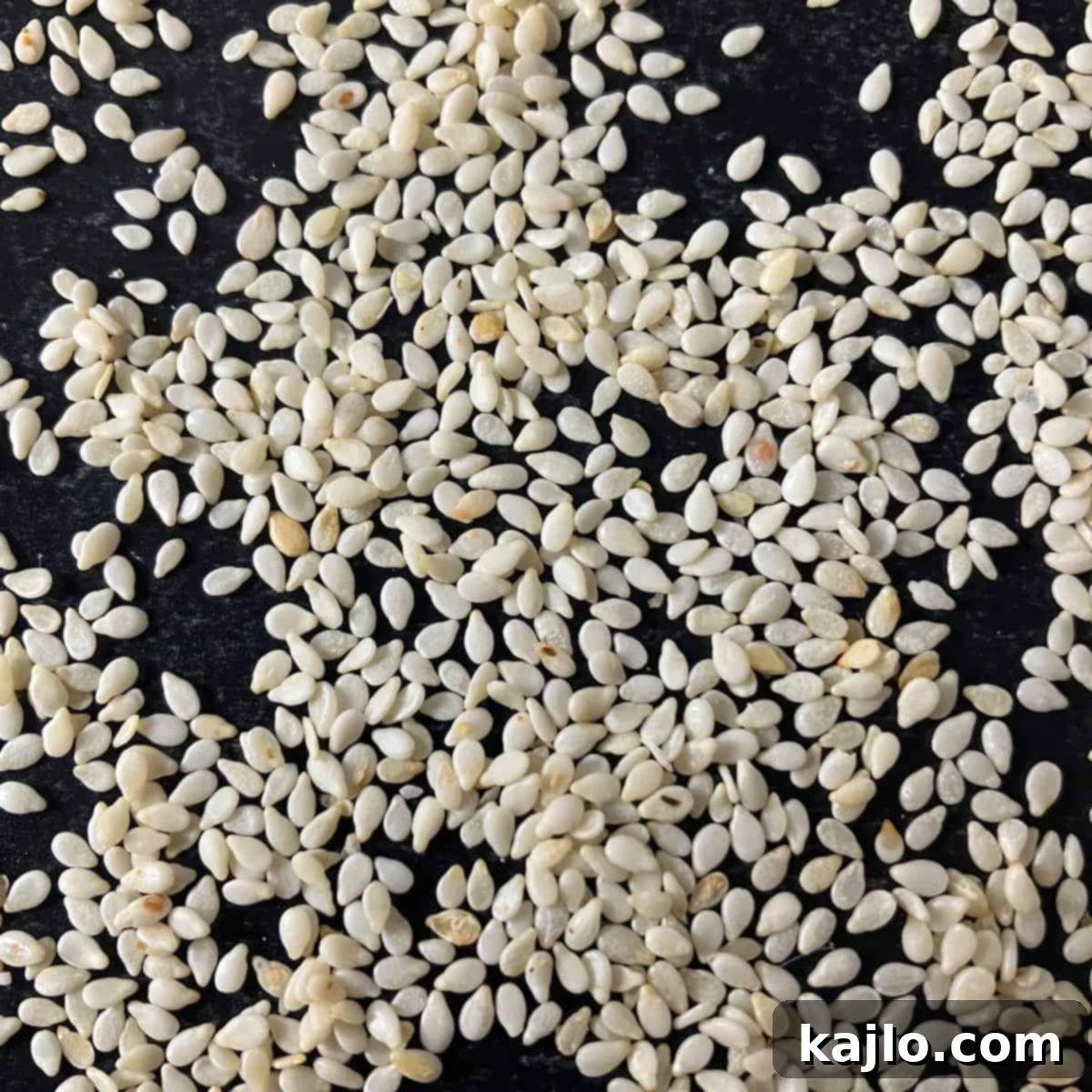
Understanding Nigella Seeds Flavor Profile
So, what exactly do nigella seeds taste like? Nigella seeds possess a distinctly unique and mildly herbaceous flavor profile. Many describe their aroma and taste as being reminiscent of oregano, often with subtle notes of onion (despite not being related to onions), black pepper, and a slight bitterness. When toasted, they develop a pleasant nutty undertone, which adds another layer of complexity. Crucially, they are not spicy, and contrary to what some sources might suggest, in my experience, they do not taste like onions in the traditional sense.
Nigella Seeds vs. Black Sesame Seeds: A Common Comparison
Are nigella seeds the same as black sesame seeds? This is a very common question, given their visual similarities. The answer is a definitive “no.” While both are small, black seeds, they are harvested from two entirely different plants and possess distinct flavor profiles. Black sesame seeds have a characteristic nutty flavor, similar to white sesame seeds but often milder and more earthy. Nigella seeds, as discussed, are herbaceous and slightly peppery. However, due to their striking resemblance in color and size, black sesame seeds are an excellent substitute for nigella seeds when the primary goal is to maintain the visual appearance of a dish.
Are Nigella Seeds the Same as Chia Seeds?
Another frequently asked question is whether nigella seeds can substitute chia seeds, or vice-versa. Again, while both are small, black seeds, their similarities largely end there. Chia seeds and nigella seeds originate from different plants and behave very differently in culinary applications.
Nutritionally, chia seeds tend to be significantly higher in fiber, offering approximately 3.4 grams per half teaspoon, compared to nigella seeds. Chia seeds also contain slightly more protein, with about 1.7 grams per half teaspoon serving.
The most substantial difference lies in their behavior when introduced to liquids. Chia seeds are well-known for their ability to absorb a significant amount of liquid and form a thick, gelatinous coating. This property makes them popular as a thickening agent, egg replacer, or for creating puddings. Nigella seeds, on the other hand, do not gel. For this reason, chia seeds are best employed as a substitute for nigella seeds primarily in dry applications, such as a topping or garnish, where their gelling property won’t interfere with the intended texture of the dish.
💰 Where to Buy Nigella Seeds?
Finding nigella seeds can sometimes be a challenge, especially in standard grocery stores in many Western countries. They are not as universally stocked as more common spices. If your local supermarkets don’t carry them, you’ll likely have better luck at specialty food stores, international grocery markets (particularly Indian, Middle Eastern, or Asian markets), or spice shops. These stores often have a broader selection of less common spices. Alternatively, for convenience and a wider selection, you can readily purchase nigella seeds online. Many reputable retailers, including Amazon, offer them. You can find them on Amazon here.
Can I Substitute Cumin for Nigella Seeds?
Substituting cumin for nigella seeds is possible, but it’s important to understand that you will be introducing a different flavor profile to your dish. Cumin seeds are characterized by a rich, warm, and earthy flavor, often with a hint of bitterness and smokiness. This contrasts with the mildly herbaceous, oregano-like taste of nigella seeds. While both are aromatic spices popular in similar cuisines, their individual contributions to a dish are distinct. Therefore, cumin seeds or cumin powder can be used as a nigella seeds replacement if you are open to, and believe you will enjoy, this flavor shift.
From a nutritional standpoint, comparing equal volumes, cumin seeds are generally lower in calories, net carbohydrates, and protein than nigella seeds. This difference is partly attributable to the fact that cumin seeds are typically larger than nigella seeds, meaning fewer seeds fit into the same volume measure. Alongside cumin, other seeds like fenugreek, coriander, caraway, and fennel can also serve as substitutes, though each will undeniably alter the overall flavor profile of your culinary creation.
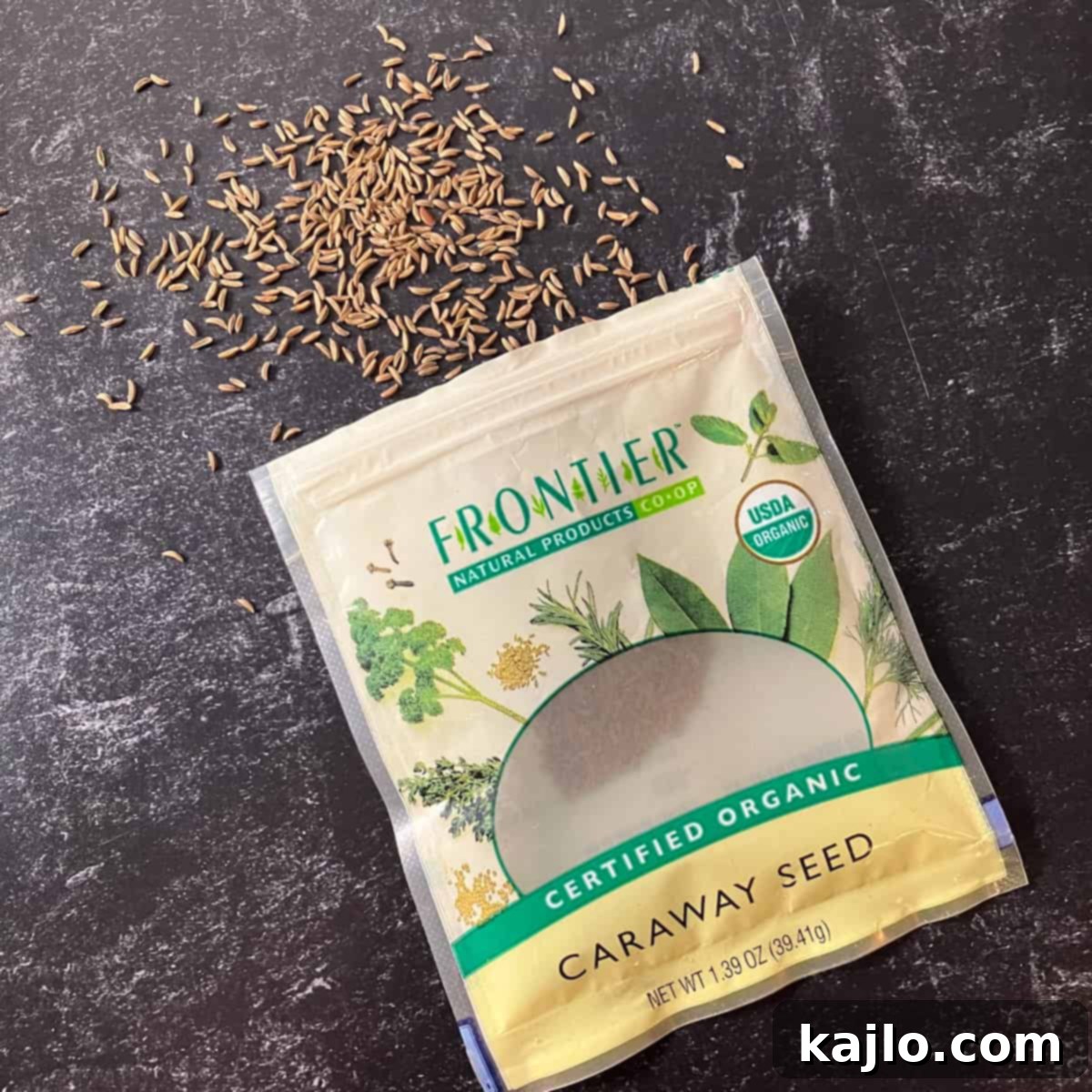
Can I Use Mustard Seeds Instead of Nigella Seeds?
Using mustard seeds as a substitute for nigella seeds is a viable option, but only if you are intentionally looking to introduce a spicy and pungent element to your recipe. Mustard seeds, particularly black mustard seeds, are known for their distinct sharp, peppery, and often fiery flavor when crushed or cooked. This is a significant departure from the mild, herbaceous profile of nigella seeds. Therefore, they are not a good direct flavor match. However, if you enjoy a considerable amount of spicy heat and wish to experiment with a bolder flavor, then mustard seeds could be an exciting nigella seed swap for you. Black mustard seeds would also offer a visual similarity due to their dark color and small size. For a milder way to add a touch of warmth or heat to dishes without the intensity of mustard seeds, a pinch of black pepper can also be considered.
Can I Substitute Poppy Seeds for Nigella Seeds?
Poppy seeds, particularly black poppy seeds, can indeed serve as a visual substitute for nigella seeds due to their similar small size and dark color. Both types of seeds can add a pleasing textural crunch to dishes. However, when it comes to flavor, there’s a clear divergence. Poppy seeds do not offer the grassy, herbaceous, and slightly peppery notes that define nigella seeds. Instead, poppy seeds are typically described as having a mild, nutty, and sometimes even slightly sweet or fruity flavor. This makes them an excellent choice for dishes where visual appeal and texture are more important than replicating nigella’s specific taste.
From a nutritional perspective, both poppy seeds and nigella seeds contribute valuable nutrients to a diet. Poppy seeds tend to be richer in certain minerals like calcium and zinc, while nigella seeds often provide more iron. Incorporating a diverse array of nuts, seeds, and other wholesome foods into your diet is a great strategy to ensure you receive a broad spectrum of essential vitamins and minerals for overall health and well-being.
📋 Nigella Seeds Nutrition Profile
While typically consumed in small quantities, nigella seeds do offer a modest nutritional contribution. Here is an estimated nutrition information for nigella seeds, based on data available from sources like Cronometer, per ½ teaspoon serving:
| Nutrient | Nigella Seeds per 1/2 tsp |
|---|---|
| Calories | 12 |
| Total Fat | 1g |
| Saturated Fat | 0g |
| Sodium | 0mg |
| Total Carbohydrates | 1.5g |
| Fiber | 0g |
| Total Sugar | 0g |
| Net Carbs | 1.5g |
| Protein | 0.5g |
| Calcium | 0% DV |
| Iron | 2% DV |
Nigella seeds naturally fit into a variety of dietary preferences and needs, being a low-carb, keto-friendly, gluten-free, dairy-free, and vegan food option.
Nigella Seeds and Their Potential Health Benefits
When considering the health benefits of nigella seeds, it’s important to maintain a realistic perspective. While nigella seeds have been revered in traditional medicine for centuries, they are typically consumed in such small amounts in culinary applications that their direct impact on overall dietary health is likely minor. That being said, they are a source of healthy unsaturated fats, which are known to contribute to cardiovascular health.
The unsaturated fats found in nigella seeds are beneficial because they have less of a negative impact on “bad” (LDL) blood cholesterol levels compared to saturated fats. If you are actively working to manage or lower your cholesterol, incorporating healthy fats from sources like nuts and seeds, including nigella seeds, is a positive step. Additionally, for individuals following low-carb or ketogenic diets to help regulate blood sugar, such as those with diabetes, nigella seeds are an excellent choice due to their low net carbohydrate content (approximately 1.5 grams per ½ teaspoon serving).
It’s crucial to address the prevalence of nutrition misinformation online, particularly claims suggesting that nigella seeds can prevent serious conditions like cancer or stomach ulcers. While ongoing research explores the potential bioactive compounds in nigella sativa (such as thymoquinone), including its antioxidant and anti-inflammatory properties, conclusive evidence for preventing specific diseases in humans through dietary consumption of small amounts of seeds is often lacking or preliminary. The most effective way to reduce the risk of nutrition-related diseases remains a commitment to a healthy lifestyle, which encompasses a balanced diet rich in whole foods, regular physical activity, and maintaining a healthy weight. There is no single “magical” food or supplement that can entirely eliminate the risk of complex diseases like cancer.
FAQs About Nigella Seeds and Substitutes
What is the difference between black sesame seeds and black cumin seeds?
Black sesame seeds and black cumin seeds (which is another name for nigella seeds) can look strikingly similar, but they are derived from different plants and have distinct flavor profiles. Black sesame seeds offer a nutty taste, comparable to white sesame seeds but often milder. Black cumin seeds, or nigella seeds, are characterized by a more herbaceous flavor, often likened to oregano, with a slight peppery note.
Black seed vs. black seed oil: what’s the difference?
“Black seed” is a common colloquial term referring to the whole seeds of the Nigella sativa plant. Black seed oil, on the other hand, is an oil extracted from these same nigella sativa seeds. It is typically used as a dietary supplement, often found in capsule form or as a liquid oil, rather than as a culinary ingredient due to its concentrated nature.
Can you eat nigella seeds raw?
Yes, nigella seeds are typically sold in their dried form and can be consumed either raw or toasted. Toasting them often enhances their flavor, bringing out nuttier notes and intensifying their aroma, which is a common practice in many cuisines.
👩🏻🍳 Other Useful Recipe Substitutions
Mastering ingredient substitutions is a valuable skill in any kitchen. Here are some other helpful substitution guides to ensure your cooking endeavors are always successful:
- Best Applesauce Substitute
- Corn Flour Substitute
- Best Popcorn Alternatives
- Best Salsa Substitutes
Watch How to Make It!
(Video content would typically appear here)
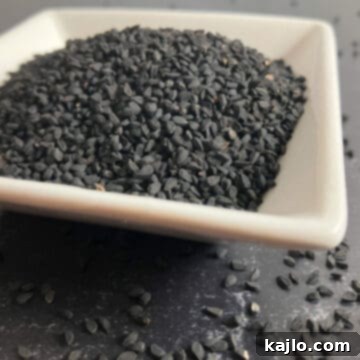
15 Best Nigella Seed Substitutes (Nigella Seeds Alternative)
Summer Yule
Rated 5 stars from 1 vote.
Print Recipe
Pin Recipe
Category Icon
5
Course Icon
Food Education
Indian, Middle Eastern
Serving Icon
1
12
kcal
Ingredients
-
black sesame seeds
OR -
white sesame seeds
OR -
dried oregano
OR -
celery seeds
OR -
poppy seeds
OR -
chia seeds
OR -
caraway seeds
OR -
fennel seeds
OR -
cumin seeds
OR -
cumin powder
OR -
fenugreek seeds
OR -
coriander seeds
OR -
coriander powder
OR -
dehydrated chopped onions
OR - mustard seeds
Instructions
- Pick a substitute based on the flavor profile and texture you want. The best nigella seed substitute for appearance and texture is black sesame seeds. The best nigella seed alternative for flavor and aroma is oregano.
- Substitute nigella seeds in your recipe in a 1:1 ratio with the chosen nigella seed alternative.
Save this Recipe
Saved!
Notes
Nutrition
Calories:
12
kcal
Carbohydrates:
1.5
g
Protein:
0.5
g
Fat:
1
g
Iron:
2
% DV
Search Icon
nigella seed alternative, nigella seed alternatives, nigella seed replacements, nigella seed sub, nigella seed substitutes, nigella seeds alternative, nigella seeds alternatives, nigella seeds substitute, nigella seeds substitutes, substitute for nigella seeds
Nutrition Info Disclaimer
All recipes on this website may or may not be appropriate for you, depending on your medical needs and personal preferences. Consult with a registered dietitian or your physician if you need help determining the dietary pattern that may be best for you.
The nutrition information is an estimate provided as a courtesy. It will differ depending on the specific brands and ingredients that you use. Calorie information on food labels may be inaccurate, so please don’t sweat the numbers too much.
“To taste” means to your preferences, which may have to be visual to follow food safety rules. Please don’t eat undercooked food.
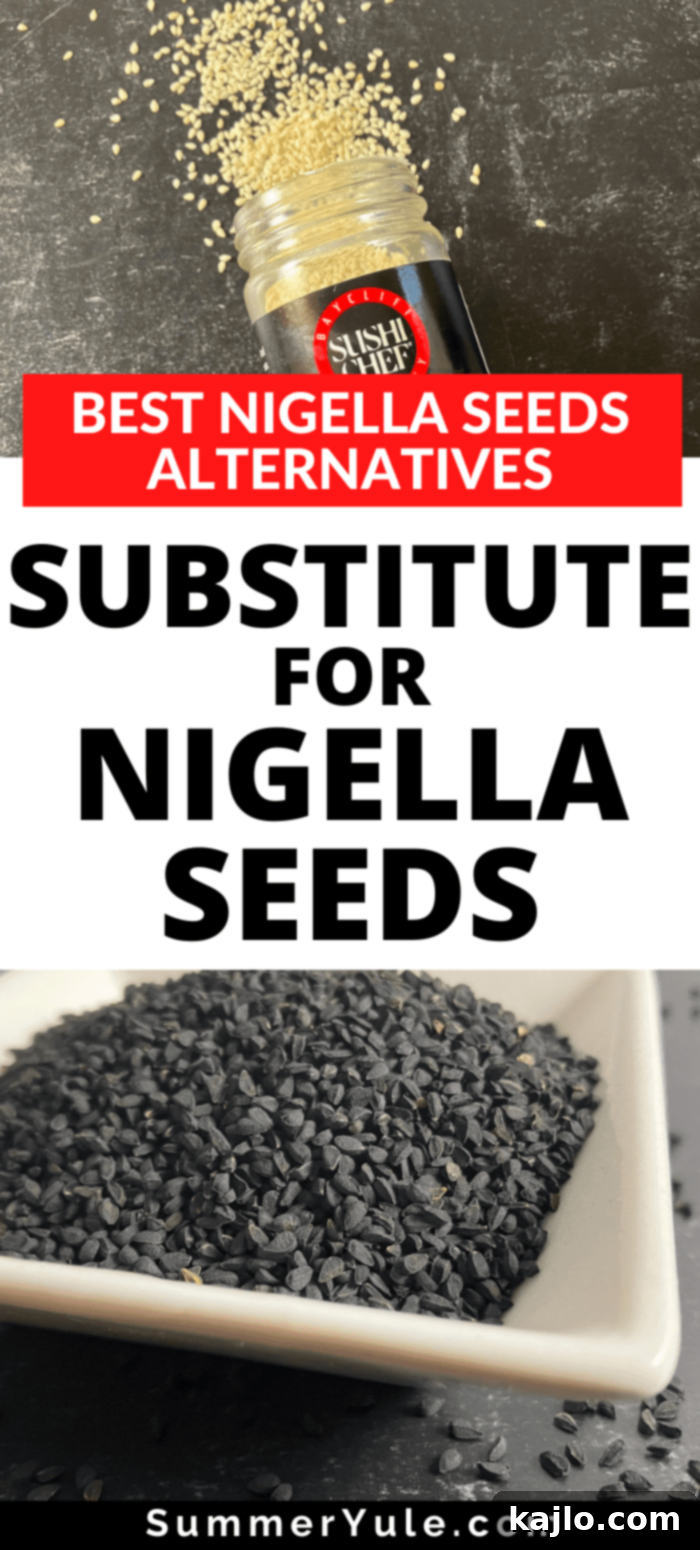
Join our community! Subscribe for all of the latest and greatest recipes, and follow me on Facebook, Pinterest, Instagram, and YouTube!
